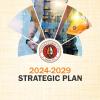About Us
Our History
The Institution of Engineers of Kenya (IEK) has a rich history rooted in the East African engineering community. Here's a timeline of our journey:
Formation of EAAE
The East African Association of Engineers (EAAE) was formed as a professional and learned body, independent of government control. Its membership spanned Kenya, Uganda, and Tanzania (Tanganyika and Zanzibar).
Breakup of the East African Community
The dissolution of the East African Community led to the splitting of many professional and learned bodies, including the EAAE.
Establishment of IEK
IEK was officially registered as a professional, learned, and independent body, continuing the legacy of the EAAE in Kenya.
Distribution of Membership
Most members of IEK are resident in Kenya, but IEK also has members outside the country. Our membership includes practicing engineers from:
- Local and central government departments
- Parastatals
- Private industry
- Consultants and contractors
- Educators and designers
- Manufacturers
- Other professionals interested in engineering
IEK Regional Branches
IEK is organized into regional branches to better serve its members across Kenya. Each branch plays a vital role in promoting engineering excellence and professional standards. The branches are:
Capital Branch
Coast Branch
Western Branch
South-Rift Branch
North-Rift Branch
Central Kenya Branch
North-Eastern Branch
Nyanza Branch

Role of the Council and Regional Branches
The interests of all members are represented by the Council of IEK, which coordinates the activities of the regional branches and associated bodies. The Council organizes national conferences, seminars, and represents IEK members in various national and international committees.
Regional branches play a vital role in:
- Organizing lectures, demonstrations, and technical visits
- Upholding professional standards
- Expanding IEK membership
- Ensuring maximum benefits for members
Members are encouraged to actively participate in regional branch activities to ensure the success of these branches.
Ideals and Objectives of IEK
Since its formation, the Institution of Engineers of Kenya (IEK) has been guided by the following ideals and objectives:
Representation of Engineering Interests
To represent the diverse interests of all branches of engineering.
Promotion of Engineering Application
To promote, encourage, and improve the application of engineering to technical and other related practices.
Facilitation of Knowledge Exchange
To facilitate the exchange of information and ideas on technical and other related matters.
Professional Integrity and Standards
To safeguard the dignity and integrity of the engineering profession and uphold the standards guiding the application of engineering knowledge to problem-solving.
Training and Membership Standards
To contribute to and set standards for theoretical, practical, and management training, leading to acceptance as a Member of IEK and registration by the Engineers Board of Kenya (EBK).
Continuous Professional Development
To commit to the continuous professional development of IEK members, ensuring they remain at the forefront of engineering excellence.
Activities of IEK
IEK is committed to providing valuable services to its members through various activities designed to keep them updated on technical, industrial, and managerial developments in engineering. These activities include:
Seminars and Lectures
IEK organizes seminars and lectures to help members stay informed about the latest advancements in technology, engineering practices, and management strategies.
Publications
IEK publishes a range of materials, including technical papers, reports, and guidelines, to provide members with valuable resources for their professional development.
Training Programs
IEK offers training programs to enhance the skills and knowledge of its members, ensuring they remain competitive in the ever-evolving engineering field.
Kenya Engineer Journal
The Kenya Engineer is the bi-monthly journal of IEK, distributed to all members. It features articles on technical developments, industry trends, and updates on IEK activities.
Stay Updated
Through these activities, IEK ensures that its members are well-equipped to tackle challenges in the engineering profession and contribute to the development of Kenya and beyond.





